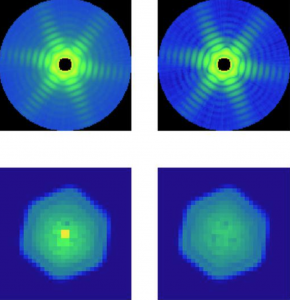Professor Janos Hajdu was awarded the Bror Holmberg Medal in recognition of outstanding contributions to chemical research. Among his accomplishments is the discovery of X-ray-driven catalysis in redox enzymes and the ”Diffraction before destruction” concept. Hajdu has previously received awards such as the 2012 Rudbeck Medal for ”Scientific Achievement” from Uppsala University, and the 2021 Gregori Aminoff Prize from the Royal Swedish Academy of Sciences (Kungl. Vetenskapsakademien, KVA) for ”the development of X-ray free-electron laser based structural biology”. More information cab be found in the press release from The Swedish Chemical Society.
Category Archives: news
Royal honour for Professor Janos Hajdu of Uppsala University
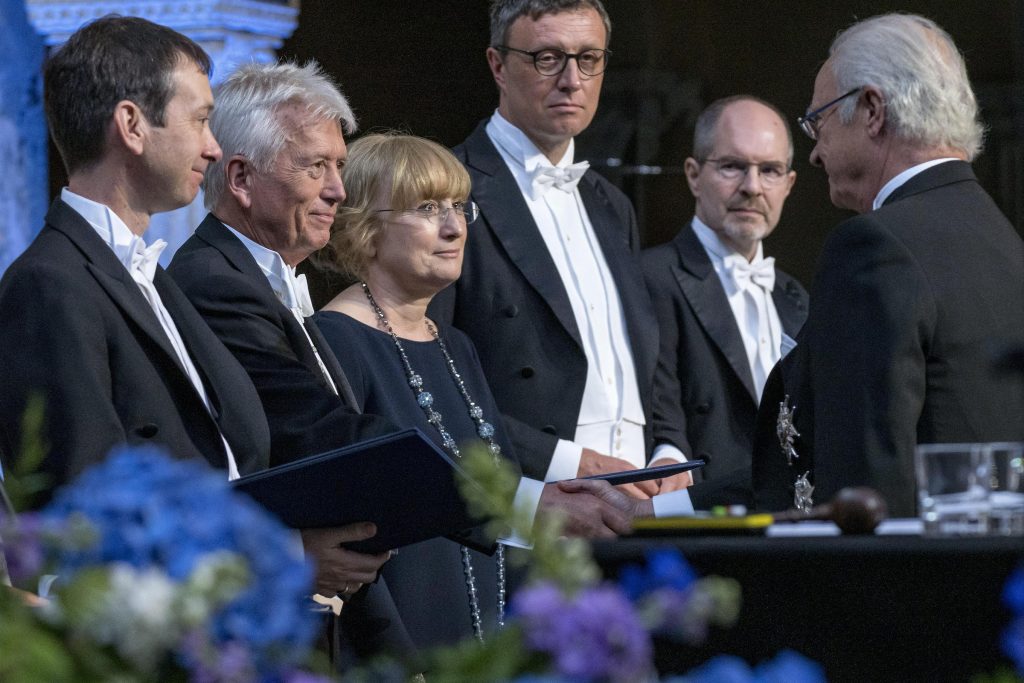
Professor Janos Hajdu receives the 2021 Gregori Aminoff Prize. Credit: KVA, Markus Marcetic
Professor Janos Hajdu of Uppsala University received the 2021 Gregori Aminoff Prize from the hands of Sweden’s King Carl XVI Gustaf on Monday the 13th of June. Due to the pandemic, the Aminoff Prize winners from the last three years were honoured together at the ceremony in Stockholm’s City Hall where the annual Nobel Prize banquet is also held.
Hajdu, who also works at the European Extreme Light Infrastructure near Prague, was awarded the Prize by the Royal Swedish Academy of Sciences together with Henry Chapman from DESY/Hamburg University and John Spence from Arizona State University for their “Explosive Studies of Biological Macromolecules”. John Spence passed away in June 2021.
Hajdu and Chapman were joined by the prize winners of 2020, Douglas C. Rees from the California Institute of Technology (Caltech) and Jian-Ren Shen from Okayama University in Japan, and 2022, Elena Conti from the Max Planck Institute for Biochemistry in Planegg, Patrick Cramer from the Max Planck Institute for Biophysical Chemistry in Göttingen, and Seth Darst from Rockefeller University in New York.
The Aminoff Prize, named after the Swedish mineralogist Gregori Aminoff, has been awarded since 1979 for outstanding achievements in crystallography. The award ceremony takes place at the annual celebration of the Royal Swedish Academy of Sciences in Stockholm.
Homepage of the Gregori Aminoff Prize at the Royal Swedish Academy of Sciences
Aminoff Prize ceremony and Aminoff Symposium in Stockholm, 13-14 June 2022
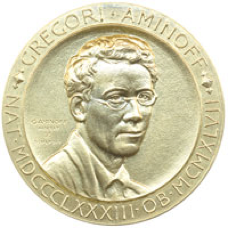 The Royal Swedish Academy of Sciences has decided to award the Gregori Aminoff Prize 2021 to Janos Hajdu, Uppsala University, Sweden, Henry Chapman, University of Hamburg, Germany, and John Spence, Arizona State University, USA, “for their fundamental contributions to the development of X-ray free electron laser based structural biology”.
The Royal Swedish Academy of Sciences has decided to award the Gregori Aminoff Prize 2021 to Janos Hajdu, Uppsala University, Sweden, Henry Chapman, University of Hamburg, Germany, and John Spence, Arizona State University, USA, “for their fundamental contributions to the development of X-ray free electron laser based structural biology”.
Details can be found here:
https://news.cision.com/kungl–vetenskapsakademien/r/aminoff-prize-rewards-explosive-studies-of-biological-macromolecules,c3192455
Swedish: https://kva.se/sv/pressrum/pressmeddelanden/aminoffpris-belonar-blixtsnabba-studier-av-makromolekyler
English: https://kva.se/en/pressrum/pressmeddelanden/aminoffpris-belonar-blixtsnabba-studier-av-makromolekyler
Due to delays caused by the pandemic, this year’s Aminoff celebrations and Symposium combine prizes from 2020, 2021 and 2022, and this offers an unusually rich scientific program.
The registration page (free of charge) of the Aminoff Symposium and the scientific programme can be found here:
https://www.kva.se/sv/kalendarium/gregori-aminoff-prizesymposium-2022
Tomas Ekeberg is portrayed in “Curie”
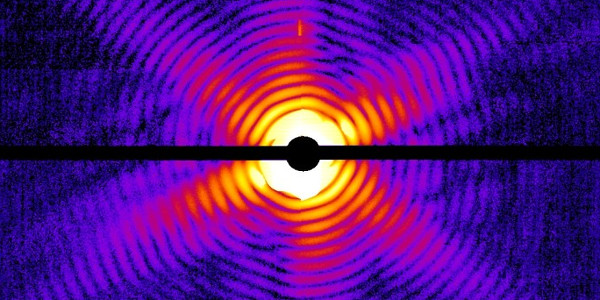
Tomas Ekeberg has been portrayed in the most recent edition of “Curie”, the web magazine from the Swedish Research Council.
Here’s the link to the article (in Swedish).
Janos Hajdu awarded the Aminoff Prize

Janos Hajdu, together with Henry Chapman, Professor at Hamburg University and John Spence, Professor at Arizona State University, was awarded by the Royal Swedish Academy of Sciences the 2021 Aminoff Prize “for their fundamental contributions to the development of X-ray free-electron laser based structural biology”.
More information can be found in the Academy’s press release.
Exploding sugar balls!
 Our article with the title “The role of transient resonances for ultra-fast imaging of single sucrose nanoclusters” (doi:10.1038/s41467-019-13905-9) has been published in Nature Communications.
Our article with the title “The role of transient resonances for ultra-fast imaging of single sucrose nanoclusters” (doi:10.1038/s41467-019-13905-9) has been published in Nature Communications.
Electrospray for XFEL sample delivery
 Our article with the title “Electrospray sample injection for single-particle imaging with x-ray lasers” (doi:10.1126/sciadv.aav8801) has been published in Science Advances.
Our article with the title “Electrospray sample injection for single-particle imaging with x-ray lasers” (doi:10.1126/sciadv.aav8801) has been published in Science Advances.
Inger Andersson received the 2019 Norblad-Ekstrand medal
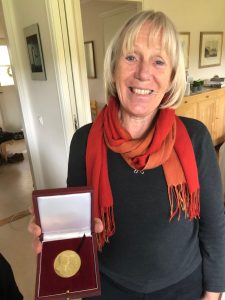 Professor Inger Andersson was awarded the prestigious Norblad-Ekstrand medal for her research photosynthetic carbon fixation. The medal is awarded annually to scientists who have distinguished themselves through outstanding research in the field of chemistry and related areas. More about Inger’s research on Rubisco and the impact on society can be found in the press release from Uppsala University and The Swedish Chemical Society.
Professor Inger Andersson was awarded the prestigious Norblad-Ekstrand medal for her research photosynthetic carbon fixation. The medal is awarded annually to scientists who have distinguished themselves through outstanding research in the field of chemistry and related areas. More about Inger’s research on Rubisco and the impact on society can be found in the press release from Uppsala University and The Swedish Chemical Society.
Job Opportunities Available
We have several job openings available. Please check biox.io for details!
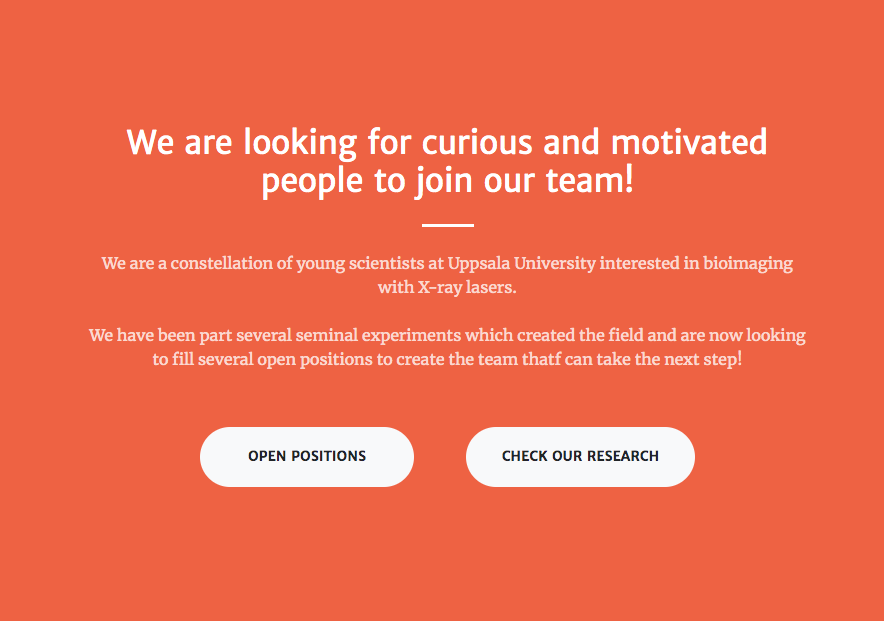
Opportunities and pitfalls in three dimensional diffractive imaging
Following the publication of our latest article, “Considerations for three-dimensional image reconstruction from experimental data in coherent diffractive imaging”, on IUCrJ, Changyong Song has written an insightful commentary on it.

